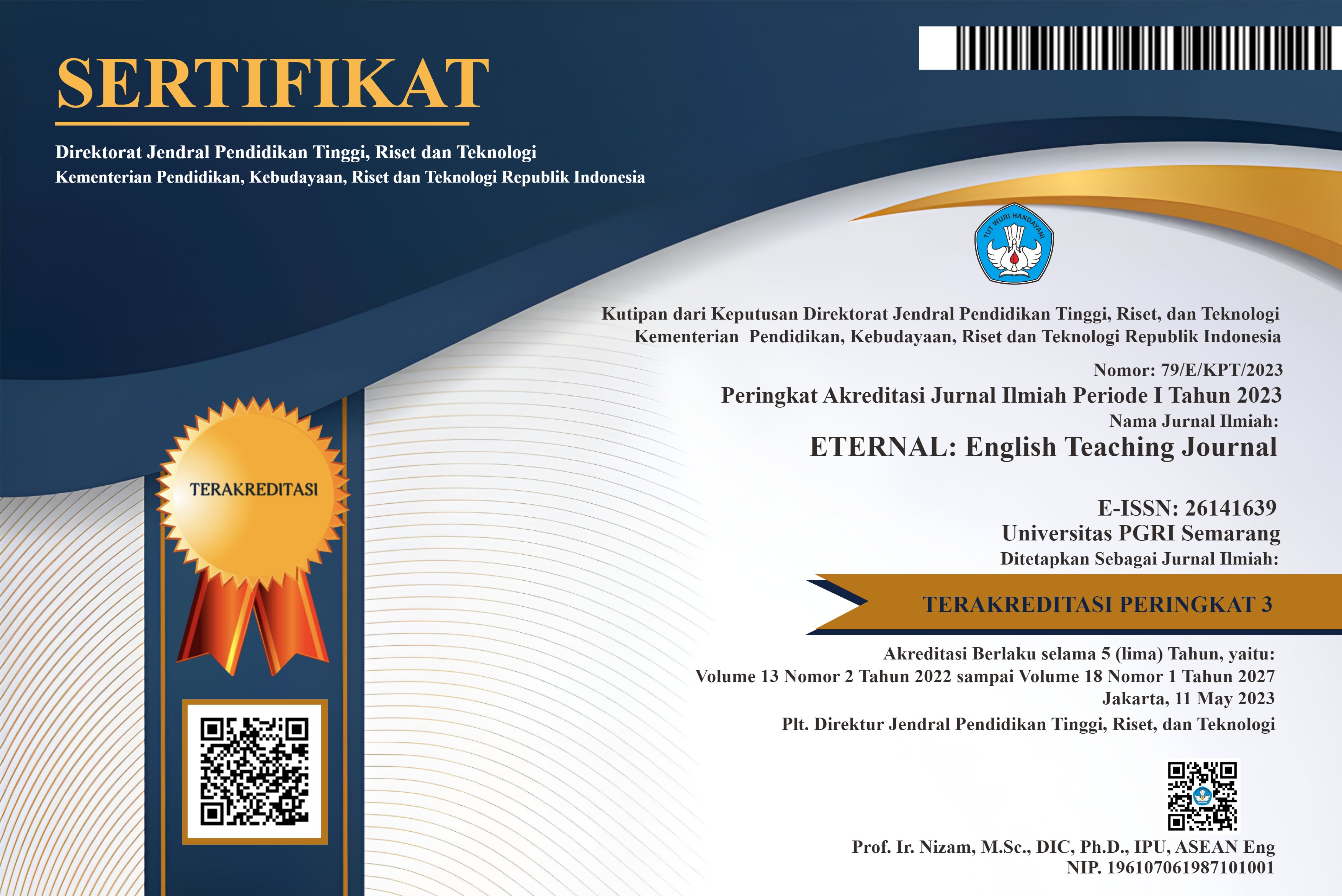Pre-Service EFL Teachers’ Beliefs about Reflective Practice in the English Language Teacher Education Program: A Life History Study
DOI:
https://doi.org/10.26877/eternal.v15i2.469Keywords:
a life history study, belief, Reflective practiceAbstract
This study examined pre-service EFL teachers’ beliefs about reflective practice in the English language teacher education program using a life history study. The study involved seven pre-service EFL teachers taking their master’s program in English language teacher education at a private university in Jawa Tengah, Indonesia. The research used a life history study which is a qualitative research design. The research instruments were reflective essays containing the past and present experience dealing with reflective practice, and a life history interview. The findings highlighted more positive beliefs than negative ones. Positive beliefs considered reflective practice effective for increasing EFL pre-service teachers’ pedagogical competence, critical thinking, and professional development. The negative beliefs viewed RP as time- and energy-consuming and could be confusing without any focus on writing. As the pedagogical implication, reflective should focus on a particular issue, be guided with practical guiding questions, not be rigorous about how often and how to do it, and provide some alternatives based on the need and conditions of the (pre-service) EFL teachers.
References
Altalhab, S. A. (2021). The reflective diary experiences of EFL pre-service teachers. Reflective practice, 22(2), 173-186. Retrieved from https://doi.org/10.1080/14623943.2020.1865903
Borg, S. (2003). Teacher cognition in language teaching: A review of research on what language teachers think, know, believe, and do. Language Teaching, 36(2), 81-109. Retrieved from https://doi.org/10.1017/S0261444803001903
Borg, S. (2017). Teacher beliefs and classroom practices. In P. Garrett & J.M. Cots (Eds.). The Routledge Handbook of language awareness. Routledge.
Braun, V. & Clarke, V. (2012). Thematic analysis. American Psychological Association.
Cirocki, A. &. (2019). Reflective Practice in English Language Teaching in Indonesia: Shared Practices from Two Teacher Educators. Iranian Journal of Language Teaching Research, (7)3, 15-35. Retrieved from http://ijltr.urmia.ac.ir
Clandinin, D. J. (2000). Narrative inquiry: Experience and story in qualitative research. Jossey bass.
Day, S. P. (2022). Exploring initial teacher education student teachers’ beliefs about reflective practice using a modified reflective practice questionnaire. Reflective Practice, 23(4), 437-351. Retrieved from https://doi.org/10.1080/14623943.2022.2048260
Farrell, T. &. (2019). ‘If I want to survive I had to use it?’: The power of teacher beliefs on classroom practices. TESL-EJ, 22(4), 1-17. Retrieved from http://ijltr.urmia.ac.ir
Farrell, T. &. (2020). "My Personal Teaching Principle is ‘Safe, Fun, and Clear’": Reflections of a TESOL Teacher. Iranian Journal of Language Teaching Research, 8(2), 83-96. Retrieved from http://ijltr.urmia.ac.ir/.
Farrell, T. &. (2021). Professional Development Through Reflective Practice: A Framework for TESOL Teachers. Canadian Journal of Applied Linguistics, 24(1), 1-25. Retrieved from https://doi.org/10.18806/tesl.v37i3.1345
Farrell, T. (2008). Reflective language teaching: from research to practice. London: Continuum Press.
Farrell, T. S. (2015). Exploring Teacher Beliefs and Classroom Practices through Reflective Practice. Language Teaching Research, 19(5), 594-610.
Farrell, T. S. (2015). Exploring teacher beliefs and classroom practices through reflective practice: A case study. Language teaching research, 19(5), 594-610. Retrieved from https://doi.org/10.1177/1362168814541722
Farrell, T. S. (2015). Promoting teacher reflection in second language education. New York: Routledge.
Gibbs, G. (1988). Learning by Doing: A Guide to teaching and learning methods. Oxford polytechnic: Further education unit.
Gudeta, D. (2022). Professional development through reflective practice: The case of Addis Ababa secondary school EFL in-service teachers. Cogent Education, 9(1), 1-26. Retrieved from https://doi.org/10.1080/2331186X.2022.2030076
Horsdal, M. (2017). The narrative interview-method, theory and ethics: Unfolding a life. In I. Goodson (Ed.), The Routledge international handbook on narrative and life history. London: Routledge.
Machost, H. &. (2023). Reflective practices in education: A Primer for practices. CBE Life Science Education, 22(1), 1-11. Retrieved from https://doi.org/10.1187/cbe.22-07-0148
Miller, J. (2020). eflective practice and health sciences. librarians: engagement, benefits, and barriers. J Med Libr Assoc, 1(17), 17-28. Retrieved from doi.org/10.5195/jmla.2020.777.
Miller, L. S. (2023). Supervision to Support Reflective Practices. Journal of Educational Supervision, 6(1). Retrieved from https://doi.org/10.31045/jes.6.1.1
OECD. (2009). Paris: OECD. Retrieved from http://www.oecd.org/dataoecd/17/51/43023606.pdf
Briscoe, P. (2017). Using a critical reflection framework and collaborative inquiry to improve teaching practice: An action research project. The Canadian Journal of Action Research, 18(2), 43-61. Retrieved from https://doi.org/10.33524/cjar.v18i2.334
Pehkonen, E. &. (2003). On relationships between beliefs and knowledge in mathematics education. European Research in Mathematics Education III: Proceedings of the Third Conference of the European Society for Research in Mathematics Education. University of Pisa and ERME. http://erme.site/cerme-proceedings-series/
Renandya, W. A. (2018). English language proficiency in Indonesia: Issues and prospects. Journal of Asia TEFL, 15(3), 618. Retrieved from http://dx.doi.org/10.18823/asiatefl.2018.15.3.4.618
Richards, J. &. (1990). Second Language Teacher Education. Cambridge.
Richards, J. C. (1994). Reflective teaching in second language classrooms. London: Cambridge university press.
Rolfe, G. F. (2001). Critical Reflection for Nursing and the Helping Professions: A user’s guide. London: Palgrave Macmillan.
Russell, T. (2018). A teacher educator’s lessons learned from reflective practice. European Journal of Teacher Education, 41(1), 4-14. https://doi.org/10.1080/02619768.2017.1395852
Shulman, L. (1987). Knowledge and teaching: Foundations of the new reform. Harvard educational review, 57, 1-23. https://doi.org/10.17763/haer.57.1.j463w79r56455411
Sonday, A. R. (2020). Case study and narrative inquiry as merged methodologies: A critical narrative perspective. International Journal of Qualitative Methods,19. https://doi.org/10.1177/1609406920937880
Suphasri, P. &. (2021). Reflective Practice in Teacher Education: Issues, Challenges, and Considerations. PASAA: Journal of Language Teaching and Learning in Thailand, 63, 236-264.
Tavakoli, H. (2012). A dictionary of research methodology and statistics in applied linguistics. Rahnama Press.
Gutiérrez, M.V.A. (2019). Collaborative reflective practice: its influence on pre-service EFL teachers’ emerging professional identities. Iranian Journal of Language Teaching Research, 7(3), 53-70. https://doi.org/10.30466/ijltr.2019.120736
Wallace, M. (1991). Training foreign language teachers: a reflective Approach. Cambridge University press.







